Class
Notes
Here
you will find the daily notes about the things we talk about in class ordered
by date.
17-2-09
Indo-European
Different
languages can be systematically compared, and depending on the number and kind
of similarities, the relationship between them can be established.
Traced
to a common attested, reconstructed or allegedly reconstructable
(proto-language i.e. en which case they are “cognate”) or they have no
attested, reconstructed or allegedly reconstructable common ancestor.
A.
Genetic Tree Theory: (August Schleicher 1861-2): the
origin of individual languages is caused by “branching off” from older
languages. Differentiation into daughter languages is abrupt and clear cut.
B.
Wave theory: (Hugo Schuchardt: 1868). Language change
starts in restricted contexts within a certain community. The change spreads to
further contexts and social groups until it is realized in all contexts and
with all speakers.
Genetic
relationships between languages, according to the Genetic Tree Theory, exist if
there’s a clear linguistic evidence of a close relationship between those
languages:
-
ancestor language: it is the parent language (i.e.
Latin)
-
daughter language (as Italian or Spanish would be in
relation to Latin)
-
sister languages (as Italian and Spanish would be
between them)
A
group of genetically related languages:
-
language family in the narrow sense, or a branch if the group is composed only
of parent languages and its daughters.
-
language family in the broad sense, when the group is formed by related
languages.
Reconstruction
of non-existent languages:
-
DEF: procedure for determining older non-recorded or
not very attested stages of language based on.
-
our knowledge of possible types of change (e.g. a
possible sound change).
Phonetically
motivated changes: simplicity in the articulation (e.g haevtu > haeftu).
Phonologically
motivated changes: maximal distinctiveness of speech sounds.
Synchronic
linguistic data (e.g. sounds in today’s languages).
Two
types of reconstruction depending on the type of synchronic linguistic data.
Based on:
-
language-internal reconstruction: if historical forms
are reconstructed on the basis of systematic relationships within a single
language (e.g. ablaut in Indo-European based on Greek).
-
Language-external (comparative) reconstruction: if
historical forms are reconstructed on systematic relationships between
different presumably genetically related languages.
Pater
– Vater – Father
Pod
– Fuss – Fast
(reconstruction
by comparing. We don’t know it in OE but we do it by comparing for example
Latin, German).
19-2-09
Accidental similarities:
●
the Greek verb “to breathe”, “blow” has the root pneu-. In Klamath of Oregon
the root for the same verb is pniw-, but these languages aren’t remotely
related.
●
in the languages of most countries, the cuckoo has a name derived from the
noise it makes (honomatopoeia).
●
we try to reconstruct the parent form of forms used in contemporary Romance
languages to denote “father”. We apply external reconstruction, we collect
words from different potentially cognate languages
Padre (Italian)
Pare (Catalan)
Père (French)
The
following processes may happen universally in the evolution of languages:
●
Weakening (lenisization): which couldn’t result in the change [t] > [d] >
[Ø] in the derivation of the above forms from their common parent form (in
agreement with the trend towards simplicity in articulatory effort).
Example
of weakening: /daðo/ (verbo dar) >
/dao/
●
Metathesis: e.g. [er] > [re] when deriving the forms in the daughter
languages.
bren
> burn
hros
> horse
●
Vowel harmony: it could cause the change of the putative vowel [a] in the first
syllable into [e] under the influence of the vowel [e] of the second syllable,
resulting in the present French form. (One vowel influences another).
foot,
feet (foti: it was the original plural).
3-03-09
I.E. and the Indo-Europeans
-
Who were the Indo-Europeans? Where did they live?
Where did they migrate?
●
A now extinct language, ancestor of a linguistic family of most of the European
languages, past and present and those found in a vast area from
●
The English orientalist and jurist Sir William Jones (1746-94) discovered the
link between Sanskrit, Latin and Greek. He discovered similarities that could
not be accidental.
English
English
belongs to the West Germanic branch. The 85% of the English vocabulary has been
lost and English has borrowed from Germanic and Romance neighbours and from
Latin and Greek the inherited vocabulary. A small proportion of the total
remains the genuine core of the language.
●
all of the 100 words most frequent in the Corpus (collection of words in
contexts) of Present Day American English (Brown Corpus) are native, and of the
second 100, 83 are native.
●
over the 50% of the English vocabulary comes from I.E., inherited or borrowed
(function words, modal verbs).
Centum languages:
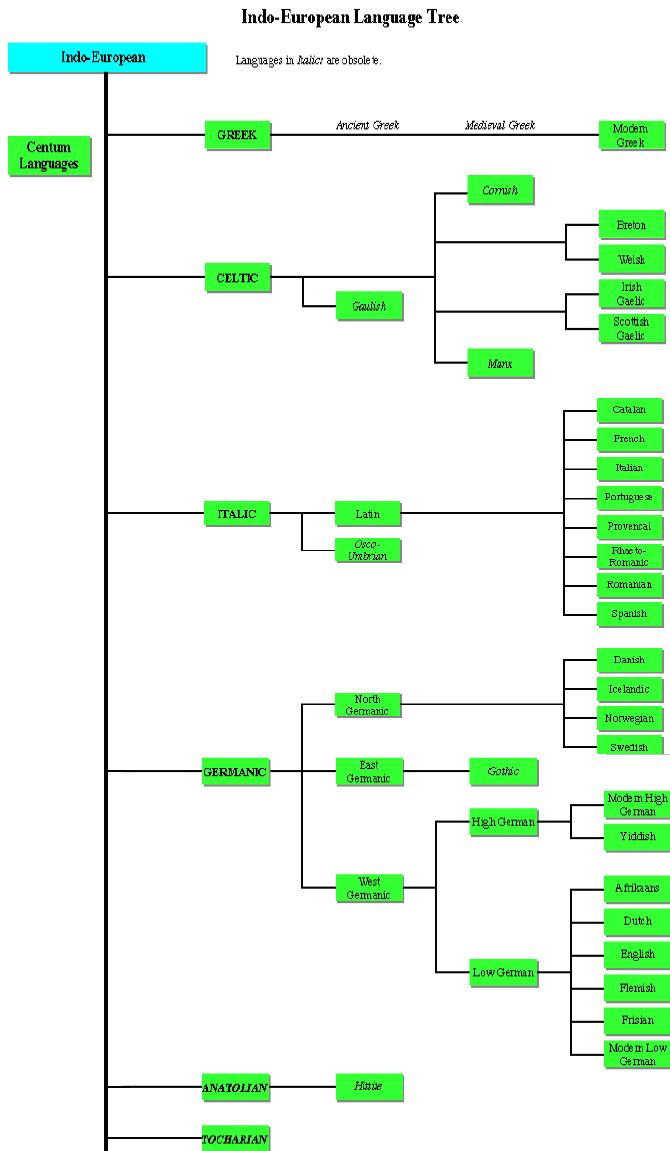
Satem languages:
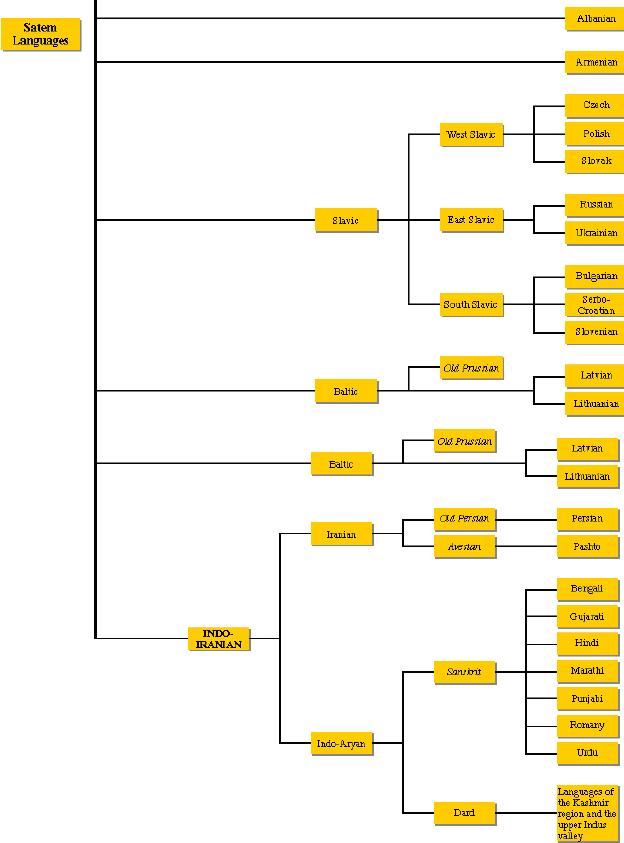
From the Romans to the
●
Celts and Romans:
-
the first inhabitants of
-
then the Celts occupied France (Gaul), the North of Italy, Netherlands, Spain,
North-West of Germany, Great Britain and Ireland in Western Europe history.
●
Celts:
-
there seems to have been no code-mixing between Celtic languages and
Anglo-Saxon.
-
this might explain the lack of Celtic influence in the nowadays English.
-
no new words were needed as Continental
Europe and
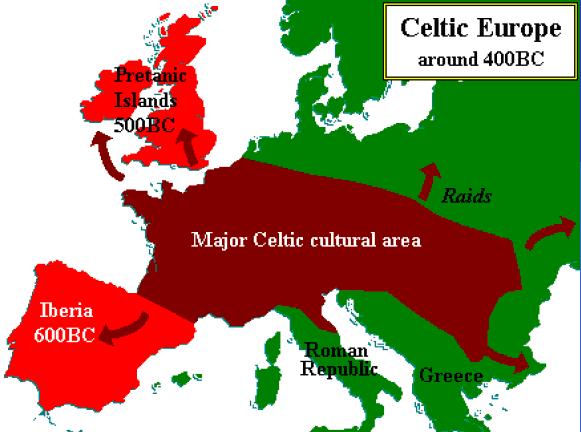
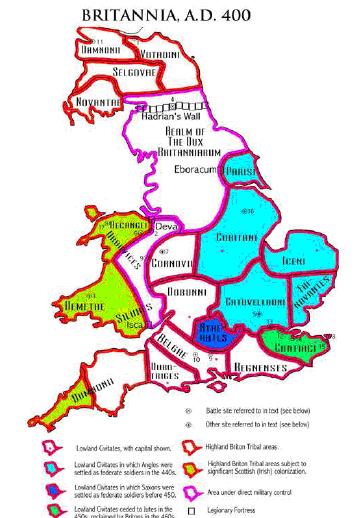
●
Britannia and Roman domination
-
Julius Cesar invaded in 55 and 54 B.C. intending to secure an area in the
South-East of
-
-
no attempt to conquer the whole island or
-
large areas in
10-03-09
Traces of Roman influence
Ø
Place-names: -cester or
Ø
Ø
De Excidio Britanniae
Ø
407/410 A.D. the Roan legions left Britannia to defend
the empire from Germanic raids.
Ø
Romanised Britons left alone to face the attacks by
the Picti (
Ø
Eventually, the inhabitants of
Ø
Germanic mercenaries landed in
Adventus Anglorum
◦ Jutes arrived in
◦ Angles (from: Angulum terrae,
◦ Saxons (called after the sax, a kind of axe) settled
in Essex, Wessa, Middlesex and
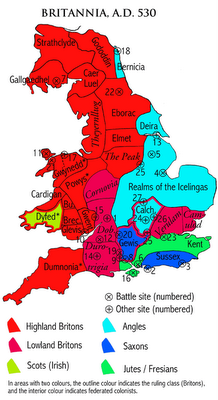
◦ The most important
◦ The seven main kingdoms competing for supremacy formed
the Anglo-Saxon Heptarchy:
Map of Anglo-Saxon
Heptarchy:

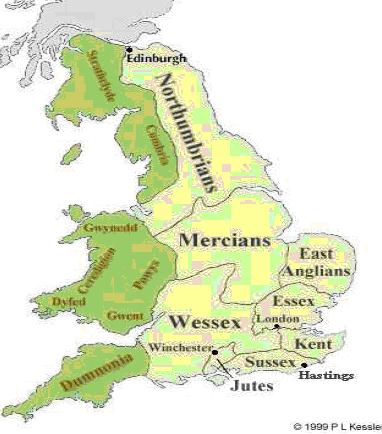
●
● In the 7th and 8th
centuries, the supremacy passed on to
●
●
At the end of the 8th century
Celts and Anglo-Saxons
○
Britons and Anglo-Saxons cohabited peacefully at first, but Celtic languages
and customs had very little influence on the Anglo-Saxons.
○
Celtic Britons resisted Saxon invaders. King Arthur –probably a Romanized
Celtic chieftain- fought briefly against the invaders, but domination was
inevitable.
○
About 557 most of
Latin influence
○
The Germanic invaders didn’t adopt Latin because:
-
there was no coexistence with Latin speaking Britons
-
decadence of Roman civilization
-
Germanic tribes invaded Britannia and had had little contact with the
○
Latinization: Pope Gregory sent
9th/11th century: Viking
Invasions
Ø
Ø
From then on pirates coming from
Map of the Viking
Invasions:

Map of Britannia’s
dialects in
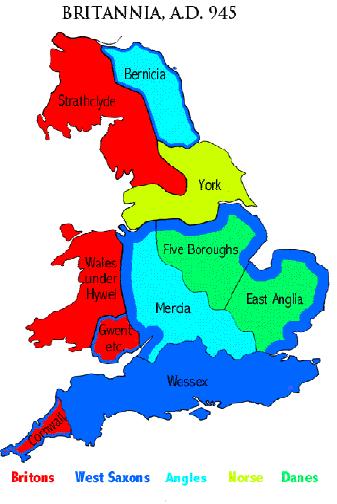
Ø
The Viking invaders were defeated by Alfred the Great
in the battle of Edington in 878.
Ø
The subsequent peace treaty led to the division of the
territory into two:
Ø
By 970, the Danelaw (parts of north Lancashire,
Westmoreland and
Map: The Danelaw:
Treaty of Wedmore
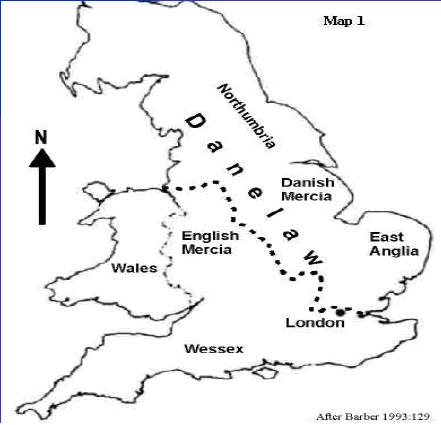
The Norman Conquest
Ø
When Edward the Confessor died, the Anglo-Saxon
noblemen elected Harold, son of Godwin, as the new king.
Ø
William of Normandy, second cousin of king Edward,
thought that he was the legal king of
12-03-09
Ø
William of Normandy invaded
Ø
Originally Norsemen, they came from the French region
of
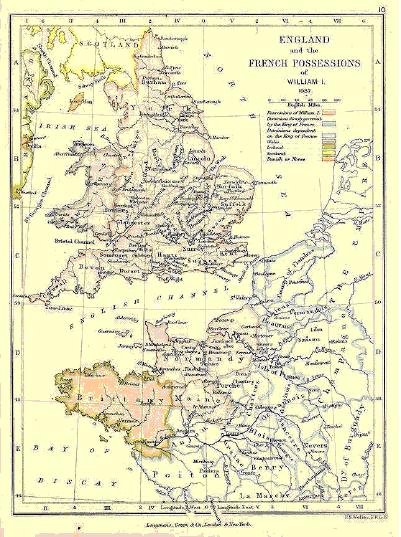
Ø
The new king imported the principle of the feudal
system: the state as a hierarchy where every member was directly responsible
for the person above him.
Ø
William brought with him Norman barons and clerics and
replaced the native nobility in the state and Church.
Ø
1086 only two of the greater landlords and only two
bishops were Saxon.
Linguistic situation until the 13th century
Ø
language of Church and court was Norman, French and
Latin.
Ø
King, greater feudal landlords, higher clergy: French,
Latin.
Ø
Lesser landlords and clergy: bilingual.
Ø
Most people of Saxons descent spoke only English.
Ø
English was disdained by the upper classes; it was no
longer written. Anglo-Saxon chronicles ended in 1155.
The rise of English
Ø
1204-1348: several events would seal the resurgence of
English over Norman French:
-
the Black Death: fewer workers meant that landlords
gave land to English-speaking tenants for rent.
-
The 100 Years War: gradual loss of dominions of the continent.
-
The creation of cities and birth of middle classes
(the lower ones became middle, and they spoke English).
-
The Parisian dialect became more fashionable than
Norman French, and was used in Universities and other centres of culture.
26-03-09
Old English
• The Old English we
generally study is a kind of standard, elaborated on the basis of
one of the dialects
spoken at that time (West Saxon) plus the addition of grammatical,
syntactic and lexical
features from other dialects.
• Different dialects
spoken depended on where each Germanic tribe settled. (See Heptarchy map).
Old English Periods
• Pre-Old English
(449/450-700), paucity of written records.
• Early Old English
(700-900), use of a literary dialect (West Saxon). Made important by King
Alfred and his collaborators.
• Old English proper
(900-1150).
Linguistic Situation in OE Period
• a. Anglian: spoken
north of river
a.1. Northumbrian:
north of river.
a.2. Mercian:
between Humber and
• b. Kentish: the
south-east of
• c. West-Saxon:
south-west of
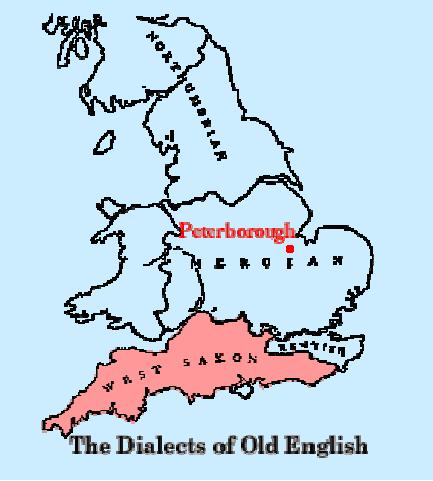
Changes from Old English to Middle
English
• Morphosyntactic Change
• Syntactic Change
• Lexical Change
Morphosyntactic Change
• Gender in the article system
disappears.
OE ME
MASCULINE se wulf þe wulf
FEMENINE seo giefu þe gift
NEUTER þæt land þe land
• Natural gender takes over in
the pronoun system: it to refer to most objects and he, she to
males and females and some objects such as ship.
• Simplification of
the cases in the article system
OE ME
Masculine All genders
Nom se þe
Acc þone þe
Dat þǽm þe
Gen þæs þe
• Simplification of noun endings
Singular Plural
OE ME OE ME
Nominative stān
stone stānas stones
Accusative stān
stone stānas stones
Genitive stānes
stone’s stanum stones’
Dative stāne
stone stāna stones
• Plural with s spreads to most nouns
Sing Plural Sing Plural
MASC. stan stanas
→ stone stones
FEM. giefu giefa
→ gift gifts
NEUT. ship shipu
→ ship ships
bok bec → book books
BUT
man men → man men
• Simplification of adjective endings
OE ME
Nom. se wilda wulf
te wild wulf
Acc. tone wildan wulf
te wild wulf
Gen. tas wildan wulfes te wild wulf
Dat. Tǽm wildan wulfe te wild wulf
Nom. ta wildan wulfas te wild wulfes
Acc. ta wildan wulfas te wild wulfes
Gen. tǽra wildra wulfa te wild wulfes
Dat. tǽm wildum wulfum te wild wulfes
Syntax From OE to ME
• Word order became more important with the loss of declensions.
• Scandinavian phrasal verbs: gyfen up, faren mid, leten up, tacen
to.
• Use of Scandinavian verbal operator get.
• Use of operator do:
Wryteth ye this with your owne hande?
Dyd ye wryte this with
your owne hande?
Celtic substratum
• Very few words of Celtic origin are found in Modern English:
• Rivers: Avon, Clyde, Dee, Don, Forth,
Severn,
• Axminster, Caerleon-on-Usk, Exmouth, Uxbridge from
the word for water.
• The word whisky/whiskey also comes from a compound of this
word: uisge beatha =
water of life
• Cities:
• Landscape words: ben, cairn, corrie, crag,
crannog, cromlech, dolmen, glen, loch,
menhir, strath, tor:
• First Names: Alan, Donald, Duncan, Eileen,
Fiona, Gavin, Ronald, Sheila
• Other words: badger -brock - tejón; peat - turba; bucket – cubo; dun = “dark coloured”, binn = “basket”
• Some of the Celtic words that entered English come from Latin. These
words
were borrowed during the Roman occupation of
• car, carry, carriage, chariot, charioteer,
carpenter, carpentry, lance, and lancer.
Latin Influence: Period of Continental Borrowing from Latin 1st to 5th
centuries A.D.
• Around 50 words through Germanic contact with
Latin influence: (from
Roman occupation of
Very little influence
during this period. Place names: ceaster (castra = “walled encampment'), for example: Dorchester,
Latin influence: Period of the Christianizing of Britain
(7th to 10th centuries AD)
• abbot, alms, pope, priest, oyster, fig,
pine, cedar, sack, sock, etc.
• loan translations (native word formations in imitation of a Latin
model) se haliga gast, godspel
Scandinavian Influence
• Toponyms
Scale (dwelling) Scalby Beck
-by (village) Ormsby, Kirkby
-gill (ravine) Aisgill
-fell (hill) Cross Fell
-thorpe (farm) Priesthorpe
-slack (dell, valley) Garton Slack
-thwaite Micklethwaite
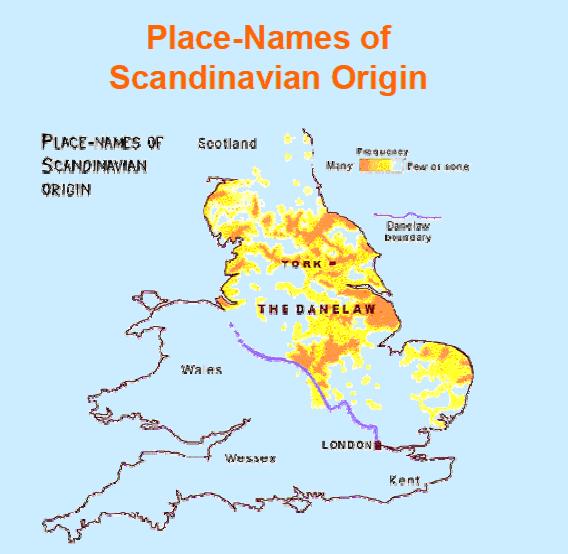
Scandinavian Influence
• egg for OE ey
• sister for swuster
• leg for shanks
• Word pairs: skiff-ship;
skirt-shirt
• OE words replaced by Scandinavian words:
• take-niman; cast-weorpan
• cut-ceorfan, die-steorfan (starve)
• Function Words
til
though
they, their, them
both
same
against
Linguistic Situation in ME Period
1100-1450/1500
• English co-existed
with Anglo-Norman and Latin.
• Latin was the
written language of the Church and many secular documents.
• After the Conquest a
certain amount of bilingualism in
Norman Influence
• In Early ME 91.5 %
of words had English origin; in later Middle English this figure had fallen to
78.8 %.
• The language of 5 or
10% of the population became the most substantial source of new words in
written ME.
• 13th c. Parisian
French superseded Anglo-Norman French.
Vocabulary
• Pre-Conquest French borrowings: prud, castel.
• Early Post-Conquest words.
natiuite, canceler, concilie, carite,
• Borrowings increased dramatically around the 13th century, not because
of structural gaps but because they were felt to be stylistically more
suitable.
Norman and French Word Pairs
• Wile (1154) guile
(1225)
• warrant(1225) guarantee
(1624)
• warden(1225) guardian
(1466)
• reward(1315) regard (1430)
Latin Borrowings in ME
• Words of common use.
aggregate, applaude, assimilate, etc.
• Words used in the church, administration, education. curate,
pulpit. legitimate; elect, convict. pedagogue, graduate, literate.
7-4-09
Caxton
and the printing press
Caxton (1415/22 – 1492). English merchant,
diplomat, writer and printer. He introduced the printing press to
Caxton’s Version of Higden’s
Polycronicon 1482
As it is knowen how
many maner peple ben in this llond ther ben also many langages and tongues.
Netheles walschmen and scottes that ben not medled with other nacions kepe
neygh yet theyr first langage and speche.
Also englysshmen
though they had fro the beygynnyng thre maner speches Southern northern and
myddle speche in the middel of the londe, as they come of thre maner of people
of
This appayryng
(impairing) of the langage cometh to two thynges/ One is by cause that children
that gon to scole lerne to speke first englysshe / & than ben
compellid to constrewe
her lessons in Frenssh and that have ben vsed syn the
Also gentilmens
childeren ben lerned and taught from theyr yongthe to speke frenssh. And
vplondyssh (rustic) men will counterfete and likene hem self to
gentilmen and arn besy
to speke frensshe for to be more sette by (be thought more of).
This maner was moche
vsed to fore the grete deth. Buth syth it is somdele chaunged For sir Johan
cornuayl a mayster of gramer chaunged the techyng in gramer scole and
construction of Frenssh in to englysshe. and more Scoolmaysters vse the same way
now in the yere of oure lord / M.iij/C.lx.v the /ix (1385) yere of kyng Rychard
the secund and leve all frenssh in scoles and vse all construction in englissh.
Also gentilmen have
moche lefte to teche theyr children to speke frenssh Hit semeth a grete wonder
that Englyssmen have so grete dyversyte in theyr owne langage in sowne and in
spekyng of it / whiche is all in one ylond. And the langage of Normandye is
comen oute of another lond / and hath one maner soune among al men that speketh
it in englond…
George Puttenham The Arte of English Poesie (1590)
Now also wheras I said
before that our old Saxon English for his many monosillables did not
naturally admit the vse of the ancient feete in our vulgar measures so aptly as
in those languages which stood most vpon polisillables, I sayd it in a
sort truly, but now I must recant and confesse that our Normane English which
hath growen since William the Conquerour doth admit any of the auncient
feete, by reason of the many polysillables euen to sixe and seauen in
one word, which we at this day vse in our most ordinarie language: and which
corruption hath bene occasioned chiefly by the peeuish affectation not of the
Normans themʃelves, but of clerks and scholers
or secretaries long since, who not content with the vsual Normane or Saxon
word, would conuert the very Latine and Greeke word into vulgar French, as to
say innumerable for innombrable, reuocable, irreuocable, irradiation,
depopulatio & such like, which are not naturall Normans nor yet French, but
altered Latines, and without any imitation at all: which therefore were long
time despised for inkehorne termes, and now be reputed the best & most
delicat of any other.
George Puttenham The
Arte of English Poesie (1590)
But after a ſpeach
is fully faſhioned to the common vnderstanding, & accepted by conſent
of a whole countrey & natiō, it is called a language, & receaueth
none allowed alteration, but by extraordinary occaſions by little &
little, as it were inſenſibly bringing in of many corruptiōs that
creepe along with the time: of all which matters, we haue more largely ſpoken
in our bookes of the originals and pedigree of the English tong. Then when I
say language, I meane the ſpeach wherein the Poet or maker writeth be it
Greek or Latine or as our case is the vulgar English, & when it is peculiar
vnto a countrey it is called the mother ſpeach of that people: the Greekes
terme it Idioma: so is ours at this day the Norman English. Before the
Conquest of the
This part in our maker
or Poet must be heedyly looked vnto, that it be naturall, pure, and the most vſuall
of all his countrey: and for the ſame purpoſe rather that which is ſpoken
in the kings Court, or in the good townes and Cities within the land, then in
the marches and frontiers, or in port townes, where ſtraungers haunt for
traffike ſake, or yet in Vniuerſities where Schollers vſe much
peeuiſh affectation of words out of the primatiue languages, or finally,
in any vplandiſh village or corner of a Realme, where is no reſort
but of poore ruſticall or vnciuill people: neither ſhall he follow
the ſpeach of a craftes man or carter, or other of the inferiour ſort,
though he be inhabitant or bred in the beſt town and Citie in this Realme,
for ſuch persons doe abuſe good ſpeaches by ſtrange accents
or ill ſhapen ſoundes, and falſe ortographie. But he ſhall
follow generally the better brought vp ſort, ſuch as the Greekes call
[charientes] men ciuill and graciouſly behauoured and bred. Our
maker therfore at these dayes ſhall not follow Piers plowman nor Gower
nor Lydgate nor yet Chaucer, for their language is now out of
vſe with vs: neither ſhall he take the termes of Northern-men, ſuch
as they vſe in dayly talke, whether they be noble men or gentlemen, or of
their beſt clarkes all is a matter: nor in effect any ſpeach vſed
beyond the riuer of Trent, though no man can deny but that theirs is the purer
English Saxon at this day, yet it is not ſo Courtly nor ſo currant as
our Southerne English is, no more is the far Weſterne mās speach: ye ſhall
therfore take the vſuall speach of the Court, and that of London and the ſhires
lying about London within lx. myles, and not much aboue. I ſay not this
but that in euery ſhyre of England there be gentlemen and others that ſpeake
but ſpecially write as good Southerne as we of Middlesex or Surrey do, but
not the common people of euery ſhire, to whom the gentlemen, and also
their learned clarkes do for the most part condeſcend, but herein we are
already ruled by th'English Dictionaries and other bookes written by learned
men, and therefore it needeth none other direction in that behalfe.
Richard
Verstegan A Restitution of Decayed Intelligence 1608
Since the tyme of Chucer,
more Latin & French, hath bin mingled with our toung than left out of
it, but of late we haue falne to ſuch borowing of woords from, Latin,
French, and other toungs, that it had bin beyond all ſtay and limit, which
albeit ſome of vs do lyke wel and think our toung thereby much bettred,
yet do ſtrangers therefore carry the farre leſſe opinion
thereof, some saying that it is of it self no language at all, but the ſcum
of many langauges, others that it is most barren and that wee are dayly faine
to borrow woords for it (as though it yet lacked making) out of other languages
to patche it vp withall, and that yf wee were put to repay our borrowed ſpeech
back again, to the langauges that may lay claim vnto it; wee ſhould bee
left litle better then dumb, or ſcarſly able to speak any thing that
should bee ſensible.
This is a thing that
eaſily may happen in ſo ſpatious a toung as this, it beeing ſpoken
in ſo many different countries and regions, when wee ſee that in ſome
ſeueral partes of England it ſelf, both the names of things
and pronountiations of woords are ſomwhat different, and that among the
countrey people that neuer borrow any woords out of the Lain or French, and o
fhtis different pronountiation one example in ſteed of many ſhall ſuffice,
as this: for pronouncing according as one would ſay in London, I would
eat more cheeſe of I had it/the northern main ſaith, Ay
ſud eat mare cheee gin ay hadet/and the westerne man ſaith: Chud
eat more cheeſe an chad it. Lo heer three different pronountiations in
our own countrey in one thing, &heerof many the lyke examples might be
alleaged.
Chaucer
Chaucer (1340 – 1400). Writer, philosopher,
diplomat and English poet. He legitimized English in art and contributed too
the English literature’s development. In 1418 he wrote Canterbury Tales.
It was the beginning of a standard.
The
birth of a literary standard
Continental verse forms based on metrics and
rhyme were replaced by the Anglo-Saxon alliterative line in Middle English
poetry.
Video
about Dr. Johnson, the beginnings of
Standard English and the rise of RP.
Until
the 18th century, there was virtually no formal guidance about the
proper spelling and pronunciation of English. The language was in such a state
of flux that writers like Jonathan Swift proposed an academy to regulate it.
It
was not until Samuel Johnson started work on his dictionary in this house that what
we know as Standard English began to emerge.
Before
Dr. Johnson, writers like Jonathan Swift warned that English was being
corrupted by change. Johnson scorned the idea of permanence in language. To
believe in that, he said, was to believe in the elixir of eternal life. Yet,
paradoxically, the work that was done in this house gave the language its first
stabilizing authority, and it’s an important milestone in the history of
English.
The
two volumes of Johnson’s dictionary linked spoken English to a printed
standard. Now, the educated middle class learnt to speak like the dictionary
and scorned the illiterate Cockneys, who did not. The dictionary’s 40.000
definitions provide the basis of Standard English and its influence has lasted
to this day. Dr. Johnson treated English very practically, as a living
language, with words having different shades in meaning. Some of his
definitions are still miracles of clarity. For example: “Heart: the muscle
which by its contraction and dilation, propels the blood through the course of
circulation. It is supposed, in popular language, to be the seat sometimes of
courage, sometimes of affection”. And some were famously idiosyncratic like:
“Oats: a grain which, in
After
Johnson, people would spell and pronounce words according to the dictionary.
By
Victorian times, accent and class were becoming synonymous. Speech, education
and advancement went together. To guarantee good English, and a good future,
parents would send their children away to school. The English public schools
took boys from all over the country and gave them a Standard English accent.
With the right accent, the educated middle-class became captains of industry,
army and navy officers, imperial civil servants, lawyers, politicians, and even
teachers who would pass their accents to the next generation. These public
school attitudes survived unchallenged until the 1960’s. By then, the public
school accent had become universally the English of radio commentators and
television interviewers. A lot of people I the Labour Party said that public
schools should be abolished because they had produced snobs. Some people
thought it helped to make class distinction all the greater. Superficially,
this is still unchanged. 20 years later, the right words and the right accent,
a world away from Cockney, are still important for a successful career. The new
boys are still drilled in
-
battlings: weekly pocket money
-
mugging: swotting up
-
cripple: punishment given by a prefect or don
-
bartering: cricket fielding practice
-
Jupiter: a notorious rascal at St. Cross, long-since
defunct
-
Pitch up: one’s parents or relations
Dr.
Johnson Wells is an expert in the evolution of British accents. But even in 20
years there have been some significant changes in public school English. There
are 2 differences in the voice quality: before, they were tense in the larynx
and they have a creaky voice (which isn’t like that now). One thing is the “a”
vowel, like in words like “trap”. The /u:/ vowel and the change in its
pronunciation shows that it’s become smart to go downmarket. People are now
embarrassed to be seen to be imitating upper-class behaviour, and this is
reflected in their pronunciation. Students speaking RP curiously show signs of
Cockney influence. Cockney is the most interesting source of new pronunciations
coming in (and it’s been like that for 500 years). Some new pronunciation
arises in Cockney and later people imitate it and becomes RP, and later it is
old-fashioned and disappears. There is a constant change over centuries.
9-4-09
Thomas
Sprat's The History of the Royal Society, 1667.
Thus they have
directed, judg'd, conjectur'd upon, and improved Experiments. But laſtly,
in theſe, and all other Buſineſſes, that have come under
their Care; there is one thing more, about which the Society has been moſt
ſolicitous; and that is, the Manner of their Difcourſe; which,
unleſs they had been very watchful to keep in due Temper, the whole ſpirit
and vigour of their Deſign, had been ſoon eaten out, by the
Luxury and Redundance of Speech. The ill Effects of this Superfluity of
Talking, have already overwhelm'd moſt other Arts and Profeſſions,
inſomuch, that when I conſider the means of happy Living, and
the Cauſes of their corruption, I can hardly forbear recanting what I ſaid
before; and concluding, that Eloquence ought to be baniſh'd out of
all civil Societies, as a thing fatal to Peace and good Manners. To this
Opinion I ſhould wholly incline, if I did not find, that it is a Weapon,
Which may be as eaſily procur'd by bad Men, as good;and
that, if theſe ſhould only caſt it away, and thoſe retain
it; the naked Innocence of Virtue would be, upon all Occaſions,
expos'd to the armed Malice of the Wicked.
This is the chief Reaſon,
that ſhould now keep up the Ornaments of Speaking in any Requeſt, ſince
they are ſo much degenerated from their original Uſefulneſs.
They were at first no doubt, an admirable Inſtrument in the Hands of wife
Men; when they were only employ'd to deſcribe Goodness, Honefty,
Obedience, in larger, fairer, and more moving Images; to repreſent Truth,
clotah'd with Bodies; and to bring Knowledge back again to our very Senſes,
from whence it was at firſt deriv'd to our Underſtandings. But now
they are generally chang'd to worſe Uſes; they make the Fancy disguſt
the beſt Things,
if they come ſound
and unadorn'd; they are in open
Purpoſe, to point
out, what has been done by the Royal Society, towards the correcting of
its Exceſſes in natural Philoſophy; to which it is, of
all others, a moſt profeſt Enemy.
They have therefore
been more rigorous in putting in Execution the only Remedy, that can be found
for this Extravagance; and that has been a conſtant Reſolution,
to reject all the Amplifications, Digreſſions, and Swellings of
Style; to return buck to the primitive Purity and Shortneſs, when
Men deliver'd ſo many Things, almoſt in an equal Number of Words.
They have exacted from all their Members, a cloſe, naked,
natural way of Speaking; poſitive Expreſſions, clear Senſes;
a native Eafſineſs, bringing all Things as near the
mathematical Plainneſs as they can; and preferring the Language of
Artizans, Countrymen, and
Merchant, before that
of Wits,or Scholars.
21-4-09
Spelling
reform
● Chancery English (Mid14th Century)
The Chancery clerks fairly
consistently preferred the spellings which have since become standard … At the
very least they were trying to limit choices among spellings, and that by the
1440s and 1450s they had achieved a comparative regularization. (J.H. Fisher et
al., An anthology of Chancery English, 1984).
Chancery Spelling Other spellings
_ such(e) sich, sych,
swich
_ much(e) moch(e),
myche(e)
_ whiche(e), whyche(e)
wich, wech
_ not/noght nat
_ many meny
_ any eny, ony
_ if/yf yif, yef
● Hart’s Ortographie, 1569
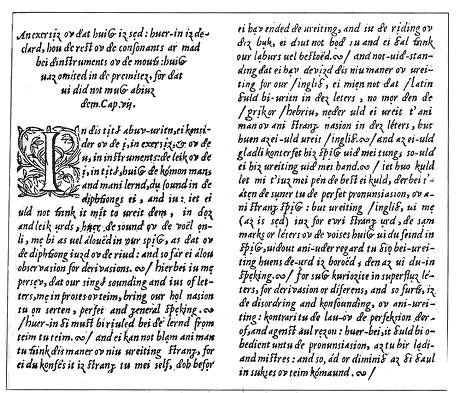
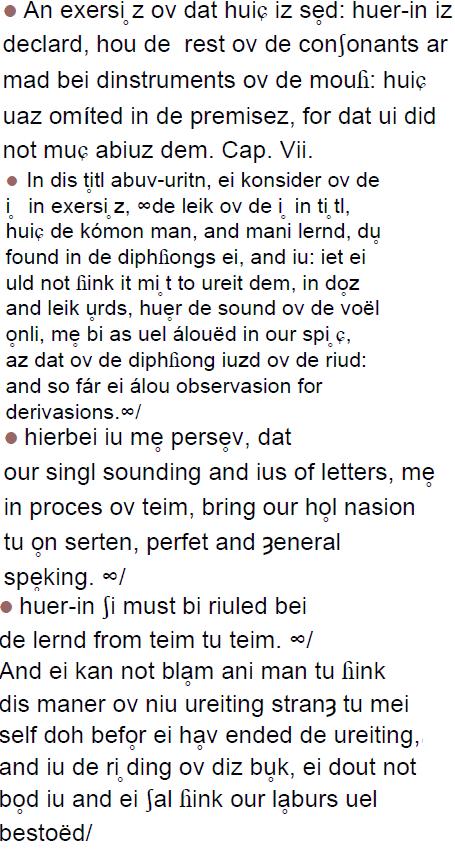
● George Bernard Shaw
To illustrate the
absurdity of English spelling, George Bernard Shaw suggested spelling the word
fish "ghoti."
-“gh” may pronounced /f/ as in laugh.
-“o” may be pronounced /i/ as in women.
-“ti” may be pronounced /sh/ as in nation.
For Shaw, reform of
the alphabet meant saving effort but laypersons were used to the alphabet and
against change:
“the waste does not
come home to the layman. For example, take the two words tough and cough.
He may not have to write them for years, if at all. Anyhow he now has tough and
cough so thoroughly fixed in his head and everybody else's that he would
be set down as illiterate if he wrote tuf and cof; consequently a
reform would mean for him simply a lot of trouble not worth taking. Consequently
the layman, always in a huge majority, will fight spelling reform tooth and
nail.”
… take the words though
and should and enough: containing eighteen letters. Heaven
knows how many hundred thousand times I have had to write these constantly recurring
words. With a new English alphabet replacing the old Semitic one with its added
Latin vowels I should be able to spell t-h-o-u-g-h with two letters,
s-h-o-u-l-d with three, and e-n-o-u-g-h with four …
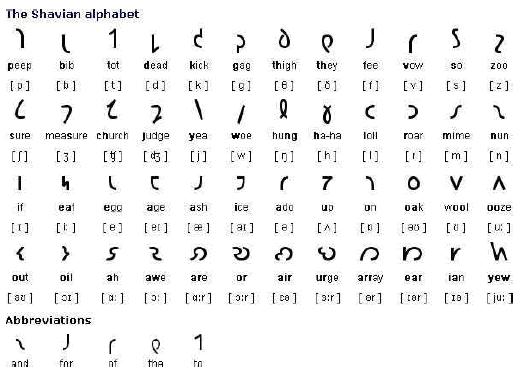
Bullokar’s
Book at Large, 1580 (Adapted from
Freeborn From Old English to Standard English 2nd ed.,
298-299)
There is evidence of these
two contrasting pairs of front and back vowels in another 16th-century
orthoepists (writers on pronunciation) William Bullokar's. The page from his Boke al Large (1580), shows an ‘amendment of
ortography' (revised alphabet) with separate letters proposed for the long
vowels [e:], [ɛ:], [o:] and [ɔ:]. It is clear that in the late 16th century they were still separate
phonemes.
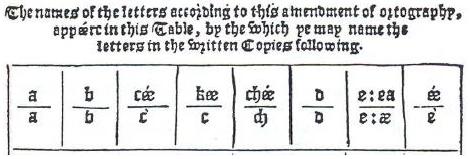
The letters for the
two mid-front vowels [ɛ] and [e] (short and long) are
shown at the end of the top row (see diagram below) as (e:a)
and (e').
Words containing these
letters in Bullokar's text in his new spelling include, for example
<e> = [ɛ] sent, qestion, terror
sent, question, terror
<a>
= [ɛː] mæning,
thærfore, encræse, decræse, whær, læu
meaning, therefore, increase, decrease, where, leave
<e’> = [eː] bre’f, agre’, be’, be’ing,
e’nglish, ke’p, we’, ye’ld
brief, agree, be, being, English, keep, we, yield
Letters for the
mid-back vowels, approximately [ɔ] and [o] (short and long) are in
the third row (see diagram below), (o) and (oo).

Letter (oo) is glossed
'betwe'n o & u', which is evidence of the raising of long [oː] towards [uː]. Examples are,
<o> = [ɔ] qestion (3 syllables),
prosody, diphthong, wronged
question, prosody, diphthong, wronged
<o>
= [ɔː] wo, on
woe, one
<oo> = [oː]-[uː] untoo, too, dooth
unto, to/too, doth
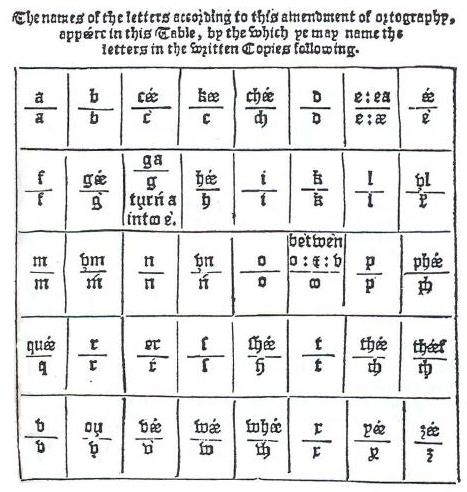
Dictionaries
DR. SAMUEL JOHNSON
-
Dates and statistics
-
The plan of the dictionary published in 1747
-
Dictionary completed in 1755
-
Definitions of 40,000 words
-
114 quotations to
illustrate usage
● Objectives:
- To fix the English language although language is the work of man, of a being from
whom permanence and stability cannot be derived… tongues, like governments,
have a natural tendency to degeneration; we have long preserved our
constitution, let us make some struggles for our language.
Those who have been
persuaded to think well of my design, will require that it should fix our
language, and put a stop to those alterations which time and chance have
hitherto been suffered to make init without opposition. With this consequence I
will confess that I have indulged expectation which nether reason nor
experience can justify.
(from the Preface to Dr Johnson’s Dictionary, 1755)
- To preserve the purity and
ascertain the meaning of our English idiom.
- To provide a dictionary for popular use.
● Criteria used in preparing the dictionary:
- The inclusion of
foreign words: the peculiar words of
every profession; the names of species –even though they required so their accents should be settled, their sounds ascertained, and their etymologies deduced.
- To settle the
orthography, or spelling of words: The chief rule which I propose to follow,
is to make no innovations, without a reason sufficient to balance the
inconvenience of change; and such reason I do not expect often to find.
- To produce a guide to pronunciation –the accentuation of polysyllables
and the pronunciation of monosyllables.
- To consider the etymology or derivation of words.
- Interpreting the words with brevity, fullness and perspicuity.
- Assigning words to classes –general, poetic, obsolete, used by
individual writers, used only in burlesque writing, impure and barbarous.
He is credited with standardizing spelling although his spellings gave
precedence to preserving a word's etymology or origin rather than its sound.
Lexicographer, ‘a writer of dictionaries, a harmless drudge’
Johnson declared his
intention to“ascertain” or fix pronunciation, “the stability of which is of
great importance to the duration of a language” (1747: 11).
When the dictionary was
published, eight years later, entry words came only with an indication of
stress-position, hence CO'MELY or INDETERMINA'TION.
To FRE'NCHIFY. v. a.
[from French.] To infect with the manner of
They miſliked
nothing more in King Edward the Confeſſor than that he was
Frenchified; and accounted the deſire of foreign language then to be a
foretoken of bringing in foreign powers, which indeed happened.
Has he familiarly diſlik'd
Your yellow ſtarch,
or ſaid vour doublet
Was not exactly Frenchified?
Shakſp.
COUGH, n.ſ. [kuch,
Dutch.] A convulſion of the lungs vellicated by ſome ſharp feruſity.
It is pronounced coff. In conſumptions of the lungs, when nature cannot
expel thr cough, nen fall into fluxes of the belly, and then they die. Bacon’s
Natural Hiſtory. For his dear ſake long reſtleſs
nights you bore, While rattling coughs his heaving veſſels tore.
Smith
NOAH WEBSTER AMERICAN DICTIONARY
OF THE ENGLISH LANGUAGE (1828)
Webster resented the fact that
He thought the English in
His books were based on the republican principle of popular sovereignty.
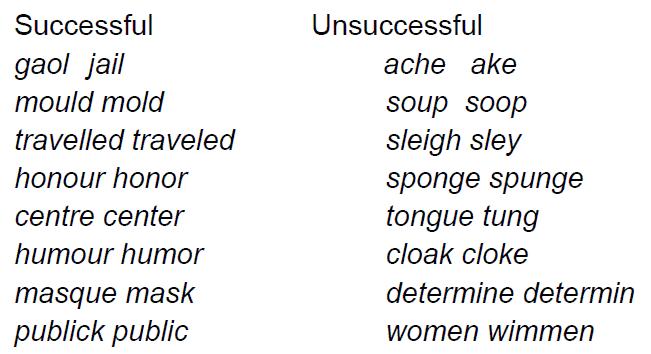
The essential feature of the dictionary is its historical method, by which
the meaning and form of the words are traced from their earliest appearance on
the basis of an immense number of quotations, collected by more than 800
voluntary workers.
The dictionary contains a record of 414,825 words, whose history is
illustrated by 1,827,306 quotations.
- 1933-1986: Supplements to the OED
- 1980s: The Supplements are integrated with the OED to produce
its Second Edition.
- 1992: The first CD-ROM version of the OED is published.
- 1992: The first CD-ROM version of the OED is published.
- James Murray (1837-1915)
- Henry Bradley (1845-1923)
- William Craigie (1867-1957)
- C.T. Onions (1873-1965)
- Robert Burchfield (1923-2004)
- Edmund Weiner (b. 1950)
- John Simpson (b. 1953)
COBUILD DICTIONARY
The first COBUILD
dictionary was published in 1987.
It was the first of a
new generation of dictionaries that were based on real examples of English -
the type of English that people speak and write every day.
Collins and the
The corpus, known as
the Bank of English™, became the largest collection of English in the world and
COBUILD uses the corpus to analyze the way that people really use the language.
28-4-09
Video
about Shakespeare
Queen
For
many years, one of the Royal Shakespeare Company’s leading directors was John
Barton.
Shakespeare
is the most comprehensive genius in terms of sensibility and understanding of
humanity. He had the greatest means of expressing that breadth.
It’s
impossible to quantify the relationship between the development of the language
and a writer of genius like Shakespeare. The First Folio of his plays, the
source for scores of Shakespearian words and phrases had a direct influence on
every one of us who speaks English today. He had an inexhaustible passion for
words; he has the largest vocabulary of any writer of English, approximately
34.000 words, which is about double what an educated person uses today in their
lifetime. In one famous passage, Shakespeare uses only two words. As well as multitudinous and incarnadine, the long list of words and uses include: accommodation, premeditated, assassination,
submerged, and obscene.
In
Loves Labours Lost he could almost have been writing his own epitaph when he
describes Armando as a man of “fire-new words”.
Shakespeare
spelled his name in many different ways. Spelling was a matter of taste. He
invented more words than anyone and no one apparently commented on that at the
time. So there was a lot of creative freedom. The actors who spoke his lines
also found him playing with the grammar of English. Nouns could become verbs.
But, above all, Shakespeare gave the
Video
about The Bible
This
golden age also saw the publication that has probably had an even greater
influence than Shakespeare’s First Folio on the language of ordinary
people. The translation of the Bible
into the English of The Authorised Version. Here at last was expressed the word
of God in terms that everybody could understand. Where Shakespeare drew on his
teeming vocabulary of 34.000 words, the new translation achieved the majestic
effects of its prose with barely 8000.
It’s
an interesting reflection on the state of the language that the poetry of the
Authorised Version came not from a single writer, but from a committee, some of
whom worked here, at the
Contemporary
with the King James’ Version of the Bible was The Book of Common Prayer, which
expresses the rites of passage in the
29-4-09
Video
about the demise of Cockney and the rise of RP
What
we call Cockney speech today, in its backbone, was the speech of the citizens
of
Up
to the 18th century, up to say about 1750, Cockney was the speech of
anybody and everybody in the city of
Video
about RP up to World War II
Varieties
of English are as old as the language itself. In fact, the idea of a correct or
proper way to speak is surprisingly recent. There is such an idea, of course;
it is often referred to as the Queen’s
English, BBC English, Oxford English or Public School English.
Public
School English is barely 100 years old. It first echoed round the playing
fields of schools like Eton, Harrow and
You
had a kind of unnatural segregation of a subset of people of the country, the
very people who are going to become the most powerful. Because of their
position of power, they were the basis of imitation. They were eminent and
eminently imitable, as it were. The presumed superiority of this accent
lingers. Research in
The
invention of the wireless turned public school English into BBC English. The
radio did for the spoken language what printing had done for the written.
Listeners could hear for the first time a definitive English speech. The voice
of information, culture, and the
World
War II was the finest hour for the BBC English. The voice of
21-5-09
Unit 4. Expansion of English
EXPANSION OF ENGLISH
l
There was no
l
l
Most of
l
Geographically
divided into
-
Southern Uplands
-
Lowlands
-
Highlands
l
In pre-history inhabited by Picts
l
Scots, Celts from
l
By 700 Anglo-Saxons conquered most of
l
l
Union of the crowns of
l
English and Scottish Parlaiments unified in 1707 (Act
of Union)
l
“Dress act” designed to disarm and finish off clan
culture (1746) after Jacobite Rising.
l
Highland Clearances 18th, 19th centuries.
Gaelic-speaking population evicted from land.
l
After 1066 the
l
Edward 1st (1272) In 1277 massive invasion.
l
By 1290s Wales virtually an English colony.
l
King Edward Ist gave his son, (Edward II), the title
Prince of Wales in 1301.
l
King Henry VIII, joined
l
Norse kingdom established in
l
Viking influence is checked in 1014 but they remain in
l
Norman nobles invade
Ireland 1169-1170.
l
Henry II invades. Pope Adrian IV grants him authority
over
l
1210-1300 English
Government in Ireland.
l
Celtic uprising 1315-1318. Edward Bruce, king of
l
Henry VII, Henry VIII, Elizabeth I strengthen English
control of
l
The plantation of
Ireland: 1586-1641
l
Scottish
Presbyterian settlers.
UNITED STATES
l
The Colonial
Period (1607–1776)
l
Humphrey Gilbert claimed the
l
Walter Raleigh’s failed settlement at
l
Jamestown 1607
l
Plymouth colony 1620
l
Maryland colony 1634
l
Colonization of the
l
The Dutch settled
l
Quaker colony
AMERICAN ENGLISH
l
l
Virginia Settlers mainly from West Country of England.
UNITED STATES
ENGLISH TODAY
l
American English
l
General American (rhotic)
l
Southern States
(non-rhotic), (drawl,
l
New England (non-rhotic)
l
l
African American Vernacular English
l
Spanglish
l
Peace of
l
The rest of New France conquered by
l
40,000 Loyalists arrived in
l
Dominion of
CANADIAN ENGLISH
l
Virtually indistinguishable from American English due
to influence of southern neighbour.
l
Use of “eh”
l
Diphthong for words like about, knife have not
been lowered as in RP and General American.
l
No distinction between initial /hw/ and /w/, making which/witch
homophones.
l
The first permanent British settlement on the African
continent was made at
l
l
Cape of Good Hope (now part of
l
The British East Africa Protectorate was established
in 1896:
l
Zanzibar, Tanzania
(after WWI)
ENGLISH IN
l
English is an official language of 16 countries:
l
in West Africa
l
in East Africa
l
in Southern Africa
l
In
l
Standard English occupies a privileged place in the
stratification of languages in these regions, but is largely a minority
language learned mainly through formal education. (Concise Oxford Companion to the English Language)
l
Early incursions by privateers John Hawkins and Sir
Francis Drake brought three boatloads of slaves to the Spanish colonies from
l
First British settlements: St Kitts in 1623 (Thomas
Warner);
l
ENGLISH-SPEAKING
l
12 independent countries: Antigua and Barbuda, The
Bahamas, Barbados, Belize (on the Central American mainland), Dominica,
Grenada, Guyana (on the South American mainland), Jamaica, Saint
Kitts/Nevis (known also as Saint Christopher/Nevis), Saint Lucia, Saint Vincent
and the Grenadines, and Trinidad and Tobago.
l
6 dependent territories: Bermuda, British Virgin
Islands, Cayman Islands, Anguilla, Turks and Caicos Islands, and
l
Standard English: used by a minority. Now lots of
American influence.
l
Creoles based on European lexicons and with African
substrates.
l
The English-based creoles can be viewed as dialects of
English or languages in their own right.
l
Mesolect: Somewhere between creole and localized
English.
l
Clive defeated the French company and captured
l
Power transferred from the English East India Company
to the British Crown (1858)
l
l
Pakistan: Urdu
(official); Punjabi; Sindhi; Pashtu; English
l
Captain James Cook claimed
l
British penal colony of
l
Tasmania settled in
1803
l
AUSTRALIAN
ENGLISH
l
London English dominant but settlers from all parts of
l
Most marked characteristic: Homogeneity but varieties
go from Broad Australian, General Australian, and Cultivated
Australian.
l
New Zealand English indistinguishable from Australian
to most outsiders.
Videos
African-English
creoles.
This
West African bauxite mine is owned by the Swiss multinational Alles Swiss. But
English is the day to day language of operations. Most of the people here are
speaking English quite fluently; maybe it’s not a classical English but it’s
English. So it’s the only means of communication.
There
is quite a high turn over in our company, that means after four, five or six
years the people are leaving the company. Who will replace them? Nobody knows.
The German may be replaced by an English, an English may be replaced by a
German, so we have to use a language that is common for everybody, and this
language is of course English.
The
miners here speak six different African languages. So they talk Creole English
to each other.
Arrival
in
Sir
Walter Raleigh, who had this farm in Devon, rolled his
In
1584 Raleigh, who had always dreamed of setting up English cities overseas,
sent two ships across the
A
settlement was established at a place they called
But
the
Almost
a generation later in 1607, three more English ships, like these, anchored in
six fathoms of water off a wooded island. The sailors called it
Many
of the Virginians who lived here, in
The
speech of
The
first penal settlements in
The
convicts also adopted Aborigine words like kangaroo,
wallaby, bandicoot, budgerigar, wombat, koala and dingo.
Convicts
and aborigines meeting for the first time communicated in pidgin English. The
Australianism walkabout is an early
example of pidgin English Down Under. Among the convicts, the first visitors to
Australian
linguist, professor John Bernard: the greatest number came from
Manifestos
of the First Fleet showed that convicts came from every county of England,
Scotland and Ireland, and so many of the words which Australians think are
Australian, are in fact county words of Great Britain. Words like cobber (meaning a friend. Came from
The
bulk of the early Europeans in Australia were, of course, convicts, and they
brought with them the “flash language”, which was a highly developed jargon
which the criminal classes used and which I suppose the people who weren’t
quite criminal, but had been convicted, learnt on the ships. And the
consequence was that there was an early complaint from the magistrates that
they couldn’t understand what was being said in their own courts. And Flash Jim
Vaux, who managed to get himself transported three times, in 1812 wrote a short
vocabulary of the Flash Language ostensibly to help the magistrates.
With
their ticket of leave, released convicts joined the pioneering free emigrants,
drovers, stockmen and grazers in the bush
or the outback. With them went flash
talk, words like swag and swagman. The first squatters established
huge sheep farms known as stations. Here words like jumbuck for a sheep and tucker
for food soon gave a distinctive flavour to Australian English.
George
Hawker’s ancestors were army officers who settled in Bungaree, north of
In
Canadian
English.
What’s
so funny about the way Canadians say “about”?
The
pronunciation of words like about and house in RP would be ǝbaut and haus,
but in Canadian English it is ǝbǝut and hǝus.
English
in
The
African sun set on the Union Jack but not on the English language. Africa needs
a link language even more than
The
African nations with hundreds of languages need a lingua franca. And 16
countries have retained English since the de-colonization. English creoles are
spreading rapidly throughout the markers and bazaars of
And
Standard English is taught in
Highlanders.
The
highlands and Islands of Scotland: Celtic culture and Gaelic language.
Since
the 18th century, Scottish Gaelic has been driven almost to
extinction. It survives on remote islands like Barra in the
When
we hear a Gaelic speaker speaking in English, it would resemble Irish because
the source is the same, as regards the Irishmen as it is for the
Highlander/Islander, that is Gaelic. And it has the same rhythm, and very often
similarity of construction…
The
English spoken here is a beautiful sweet sounding, rolling, soft type of
English. It is a very comforting sound compared with the whiskied, fast moving
accents you get from the cities and towns. The people from Barra speak Gaelic
as freely as English, but their language faces extinction. In these places you
can see the wounds inflicted by world English on a traditional local culture.
Gaelic is their ancestral tongue, but even there, they sometimes drop into
English.
Highlanders
after Culloden.
Scots
Gaelic has been a persecuted language ever since the revolt of 1745 led by
Bonnie Prince Charlie was defeated when the ill-equiped Highlanders were mowed
down by the British artillery at the battle of Culloden, the subject of this
early television documentary. In reality the rebellion was small. But
Highlanders have never forgotten that it was used as a pretext to impose the
English way of life. After Culloden, the laws that were enacted were ordained
really to destroy the way of life, the language and the customs of the
Highlanders and Islanders. The Highlander wasn’t permitted to practise his
language or to wear his native dress (like the kilt nowadays), to carry arms
(which was quite significant for them then), to be educated through the medium
of Gaelic. It made it very difficult for the Gaelic culture to survive.
The
Indian
English.
With
its 14 compelling linguistic traditions,
Puritans.
Farther
north of James Town around the